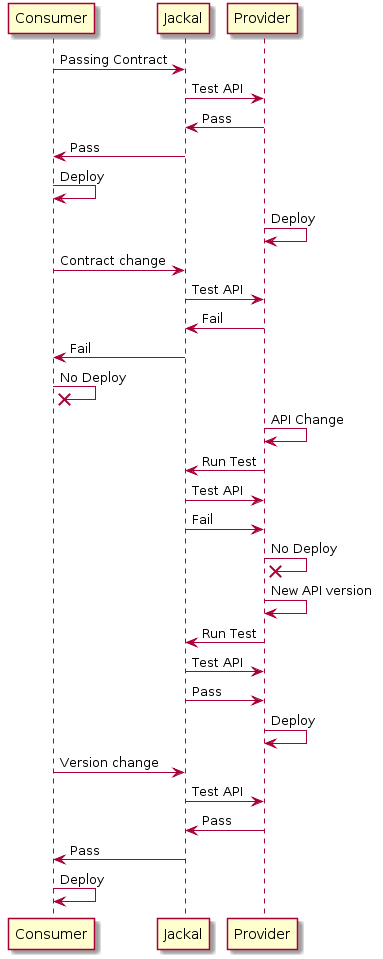A microservice for consumer-driven contract testing. Read about Jackal on the findmypast tech blog.
- Running Locally
- Running on Docker
- Testing Contracts as a Consumer
- Testing Contracts as a Provider
- Sequence of Testing
To install Jackal
npm i -g jackalTo start a local instance of the Jackal server with the default configuration:
jackal startAlternatively, to specify a custom configuration file:
# Using a JSON configuration file
jackal start -c /path/to/custom/config.json
# Using a YAML configuration file
jackal start -c /path/to/custom/config.yamlWe recommend defining a custom configuration file, both JSON and YAML formats are supported, see the Jackal Configuration Guide for more information. The default configuration is as follows:
db:
path: db.json
logger:
environment: development
statsD:
host: localhost
port: 8125
prefix: jackalJackal should now be available at http://localhost:25863.
A health endpoint is provided at /api/health.
To start a dockerised instance of Jackal with the default configuration:
docker run -p 25863:25863 findmypast/jackal
Jackal should now be available at http://localhost:25863. A health endpoint is provided at /api/health.
Make sure to define a contracts file, e.g:
itunes_search_app: # consumer name
itunes: # provider name
search_by_term_and_country: # api endpoint name
OK: # scenario name
request:
baseUrl: 'https://itunes.apple.com'
path: '/search'
query: '?term=mclusky&country=gb'
method: GET
headers:
Header-Name: headerValue
Another-Header-Name: headerValue
timeout: 1000
response:
statusCode: 200
body: # body uses Joi type definitions (https://github.com/hapijs/joi)
resultCount: Joi.number().integer()
results:
- trackName: Joi.string()
collectionName: Joi.string()The file is also accepted in the equivalent JSON format.
Supported file extensions are .yaml, .yml, and .json. You can also add .skipped to the contract file to skip executing it.
In order to prevent large, unwieldy contracts files becoming a necessity, it is possible to specify contracts for a single consumer across multiple files. This behaviour is only possible when using the Jackal client to communicate with the Jackal server - it is not possible to upload many files to the server in a single request.
Each file must follow the format illustrated above and must share a common consumer at the top level. Currently, these files are merged at consumer level, so if a provider is defined in multiple files then contracts defined for the same provider in a later file may overwrite those in an earlier one.
Contracts can be sent to a Jackal server using the Jackal client by specifying the URL of the Jackal server and the path to the contracts file or directory:
jackal send <jackalUrl> <contractsPath>
By default, the results of sending contracts to a Jackal server using the client are displayed in spec format, for information on how to specify alternatives, please consult the Jackal Client Guide.
Contracts can also be sent to a Jackal server using curl (or similar), however only a single contracts file can be sent, sending a directory of files is not possible:
curl -X POST --silent http://jackal.url:25863/api/contracts -H 'Content-Type: application/json' -d @contracts.jsonYou should then receive a JSON object in response, for example:
{
"message": "All Passed",
"status": "PASSED",
"results": [
{
"name": "itunes/search_by_term_and_country/OK",
"consumer": "itunes_search_app",
"status": "Pass",
"error": null
}
]
}Provider contracts stored on a Jackal server can be run using the Jackal client by specifying the URL of the Jackal server and the name of the provider for which contracts should be run:
jackal run <jackalUrl> <providerName>
By default, the results of running provider contracts on a Jackal server using the client are displayed in spec format, for information on how to specify alternatives, please consult the Jackal Client Guide.
Provider contracts stored on a Jackal server can also be run using curl (or similar):
curl -X GET --silent http://localhost:25863/api/contracts/PROVIDER_NAME -H 'Content-Type: application/json'You should then receive a JSON object in response, for example:
{
"message": "All Passed",
"status": "PASSED",
"results": [
{
"name": "itunes/search_by_term_and_country/OK",
"consumer": "itunes_search_app",
"status": "Pass",
"error": null
}
]
}This diagram illustrates the flow of our expected use case.






